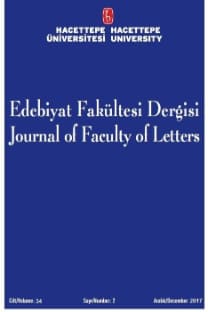Akademinin atıf dizinleri ile savaşı
The war of academia with citation indexes
___
- Adair, W.C. (1955). Citation indexes for scientific literature? American Documentation, 6, 1: 31-32.
- Al, U. ve Soydal, İ. (2012). Dergi kendine atıfının etkisi: Energy Education Science and Technology örneği. Türk Kütüphaneciliği, 26, 4: 699-714.
- Al, U. ve Soydal, İ. (2011). Atıf dizinlerinin değişen yapısı. Cumhuriyet Bilim ve Teknoloji, 24, 1244: 12-13.
- Baird, L.M. ve Oppenheim, C. (1994). Do citations matter? Journal of Information Sci- ence, 20, 1: 2-15.
- Bakkalbasi, N., Bauer, K., Glover, J ve Wang, L. (2006). Three options for citation tracking: Google Scholar, Scopus and Web of Science. Biomedical Digital Libraries, 3, 7. 6 Eylül 2013 tarihinde http://www.bio-diglib.com/content/3/1/7 adresinden erişildi.
- Balcı, M. (2011). Yüksek sayıda makalenin sırrı. Matematik Dünyası, 4: 9-13.
- Batmaz, A. (2013). Türkiye’de bilim üretimi ve arkeoloji. Cumhuriyet Bilim ve Teknoloji, 1369: 18.
- Center for Research Libraries. (2014). Compare databases. 10 Temmuz 2014 tarihinde http://adat.crl.edu/databases adresinden erişildi.
- Demircioğlu, M.Y. (2013). Doçentlik sınavında idari süreç. Türkiye Barolar Birliği Dergisi, 109: 141-176.
- Elsevier. (2014). Content overview. 10 Temmuz 2014 tarihinde http://www.elsevier.com/ online-tools/scopus/content-overview adresinden erişildi.
- Falagas, M.E. ve Alexiou, V.G. (2008). The top-ten in journal impact factor manipulation. Archivum Immunologiae et Therapiae Experimentalis, 56, 4: 223-226.
- Hacettepe Üniversitesi. (2013a). Hacettepe Üniversitesi öğretim elemanlarının bilimsel niteliklerinin geliştirilmesi projesi. 6 Eylül 2013 tarihinde http://www.research. hacettepe.edu.tr/tr-TR/nitelik/ adresinden erişildi.
- Hacettepe Üniversitesi. (2013b). Hacettepe Üniversitesi öğretim üyeliğine yükseltme ve atama kriterleri taslakları. 6 Eylül 2013 tarihinde http://www.hacettepe.edu.tr/aka- demik/atama-kriterleri-taslak.php adresinden erişildi.
- Herther, N.K. (2009). Research evaluation and citation analysis: key issues and implica- tions, Electronic Library, 27, 3: 361-375.
- Mabe, M. ve Amin, M. (2001). Growth dynamics of scholarly and scientific journals. Scientometrics, 51, 1: 147-162.
- Mark Ware Consulting. (2006). Scientific publishing in transition: an overview of current developments. 24 Mayıs 2014 tarihinde http://www.stm-assoc.org/2006_09_01_ Scientific_Publishing_in_Transition_White_Paper.pdf adresinden erişildi.
- Moed, H. (2006). Bibliometric rankings of world universities. Centre for Science and Technology Studies Report 2006-01. 3 Eylül 2013 tarihinde http://ranking.crimea. edu/fde/datas/2008/01/04/1199436420/2.pdf adresinden erişildi.
- Moed, H.F. (2002). The impact factors debate: the ISI’s uses and limits. Nature, 415: 731-732.
- Mustafa Kemal Üniversitesi. (2013). Mustafa Kemal Üniversitesi bilimsel faaliyet teşvik sistemi uygulama esasları. 12 Eylül 2013 tarihinde http://www.mku.edu.tr/fi- les/577_dosya_1368695130.pdf adresinden erişildi.
- Öğretim Üyeliğine Yükseltilme ve Atanma Yönetmeliği. T.C. Resmi Gazete (17588, 28 Ocak 1982).
- Tekinsoy, M.A. ve Mısır, M.B. (2012). Öğretim üyeliğine atanma sürecinin başlangıcı, ek koşullar ve jüri raporları. Ankara Üniversitesi Hukuk Fakültesi Dergisi, 61, 1: 351-382.
- Testa, J. (2011). The globalization of Web of Science: 2005-2010. 9 Eylül 2013 tarihinde http://wokinfo.com/media/pdf/globalwos-essay.pdf adresinden erişildi.
- Thomson Reuters. (2013a). Journal Citation Reports notices. 12 Eylül 2013 tarihinde http://admin-apps.webofknowledge.com/JCR/static_html/notices/notices.htm ad- resinden erişildi.
- Thomson Reuters. (2013b). Journal Citation Reports. 10 Temmuz 2014 tarihinde http:// admin-apps.webofknowledge.com/JCR/ adresinden erişildi.
- ULAKBİM. (2013). TÜBİTAK Türkiye adresli uluslararası bilimsel yayınları teşvik programı (UBYT). 12 Eylül 2013 tarihinde http://www.ulakbim.gov.tr/cabim/ ubyt/ adresinden erişildi.
- Ulrichsweb Global Serials Directory. (2013). Ulrichsweb: Global Serials Directory. 6 Eylül 2013 tarihinde http://ulrichsweb.serialssolutions.com/ adresinden erişildi.
- ÜAK. (2013). Doçentlik sınavı alanları ve başvuru koşulları. 6 Eylül 2013 tarihinde http://www.uak.gov.tr/?q=node/13 adresinden erişildi.
- Van Noorden, R. (2013). New record: 66 journals banned for boosting impact factor with self-citations. 10 Temmuz 2014 tarihinde http://blogs.nature.com/news/2013/06/ new-record-66-journals-banned-for-boosting-impact-factor-with-self-citations. html adresinden erişildi.
- Van Noorden, R. (2012). Record number of journals banned for boosting impact factor with self-citations. 10 Temmuz 2014 tarihinde http://blogs.nature.com/news/2012/06/ record-number-of-journals-banned-for-boosting-impact-factor-with-self-citati- ons.html adresinden erişildi.
- Van Raan, A.F.J. (2005). Fatal attraction: Conceptual and methodological problems in the ranking of universities by bibliometric methods. Scientometrics, 62, 1, 133-143.
- YÖK. (2013). Yükseköğretim kurumlarının öğretim üyeliğine atanma kriterleri. 6 Eylül 2013 tarihinde http://personel.yok.gov.tr/AtanmaKriter/ adresinden erişildi.
- YÖK. (2014). Tüm üniversiteler. 10 Temmuz 2014 tarihinde http://www.yok.gov.tr/web/ guest/universitelerimiz;jsessionid=9C399F3EB7FB7A6C38B9B1372CD10B5B adresinden erişildi.
- Zhou, Y-B., Lü, L. ve Li, M. (2012). Quantifying the influence of scientists and the- ir publications: distinguishing between prestige and popularity. New Journal of Physics, 14, 3: 033033. 10 Temmuz 2014 tarihinde http://iopscience.iop.org/1367- 2630/14/3/033033 adresinden erişildi.
- ISSN: 1301-5737
- Yayın Aralığı: 2
- Başlangıç: 1983
- Yayıncı: Emine Erdoğan Özünlü
Türkçe koşul tümcelerinde ne soru sözcükleri
Akademinin atıf dizinleri ile savaşı
Osmanlı İmparatorluğu’nda Esnaf Yeniçeriler
Eye-Tracking analysis of the processing of Turkish complex sentences with Wh phrases
Sonnet in the 21st century: George Szirtes’s sonnet sequences
Ankara Resim ve Heykel Müzesi’nin duyulmamış Tarihi
Geleneğin devamı: Bahriyeli Ressam Hüseyin Hüsnü Tengüz’ünkKıyafet albümü
Şiirle Tarihin Kesişim Noktasında Gülten Akın’ın Celâliler Destanı
Bediüzzaman mezarlığı’nda ölüm: Toplumsal/kültürel görünümler
Yılmaz Selim ERDAL, Nejla Serpil ALTUNTEK
Açık dergi sisteminin Edebiyat Fakültesi Dergisi’ne uygulanması
